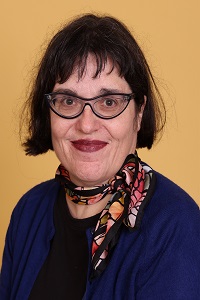Professor Denise McCoskey
IAS Fellow at University College, October-December 2023
Contact Details
- Home Institution email: mccoskde@miamioh.edu
- Durham email: denise.e.mccoskey@durham.ac.uk
- Durham Tel: +44 (0)191 3344693
 Denise Eileen McCoskey is a Professor of Classics and affiliate in Black World Studies at Miami University (Ohio). She graduated with distinction in all subjects from Cornell University and received her PhD in Classical Studies from Duke University. In 2009, she was the recipient of the American Philological Association’s Award for Excellence in Teaching at the College Level.
Denise Eileen McCoskey is a Professor of Classics and affiliate in Black World Studies at Miami University (Ohio). She graduated with distinction in all subjects from Cornell University and received her PhD in Classical Studies from Duke University. In 2009, she was the recipient of the American Philological Association’s Award for Excellence in Teaching at the College Level.
Professor McCoskey has published on a wide range of topics, including sexual difference in Greek tragedy, women in Strabo’s Geography, and identity and difference in the ancient Jewish diaspora; in addition, she co-authored the book Latin Love Poetry with her colleague Zara Torlone (2014).
Professor McCoskey’s main area of research focuses on the role of race in the ancient Greek and Rome worlds, as well as the reception and distortion of ancient ideas about race in more modern eras. She is the author of Race: Antiquity and Its Legacy (2012) and served as editor of A Cultural History of Race in Antiquity (2021). She also contributed a chapter on “Race and Democracy” to A Cultural History of Democracy in Antiquity (2021) and has published an article on the representation of enslaved persons in 19th century Latin schoolbooks. In addition, her forthcoming article places the life of the Latin playwright Terence in historical context, in part by tracing the ways his Africanness has been both suppressed and at times erased by scholars in later centuries.
Professor McCoskey is currently at work on a multi-year project exploring the role of eugenics in early twentieth-century American classical scholarship, for which she received a National Endowment of the Humanities summer stipend in 2018. This project examines the ways racist thought permeated the field of classics in the United States in the first half of the twentieth century through concepts and methods derived from the contemporary eugenics movement. A preliminary part of this work was recently published in the American Journal of Philology’s special issue devoted to diversifying classical philology.
In response to the growing use of classical antiquity by white nationalist groups, Professor McCoskey has become more involved in recent years in presenting her research to non-specialist audiences. This effort included a number of online essays for the (now-defunct) journal Eidolon: “Black Athena, White Power,” Eidolon (2018) https://eidolon.pub/black-athena-white-power-6bd1899a46f2, “Bad to the Bone: The Racist application of DNA science to classical antiquity,” Eidolon (2018) https://eidolon.pub/bad-to-the-bone-617ca3e37347 and “What Would James Baldwin Do? Classics and the Dream of White Europe,” Eidolon (2017) https://eidolon.pub/what-would-james-baldwin-do-a778947c04d5.
At Durham, Professor McCoskey will be continuing her research on classics in the early twentieth-century while also helping document some of the ways Greek and Roman history has been evoked in contemporary political contexts as part of the project “Abusing Antiquity: A transnational study on the use of the Classical past to support and legitimise extremist, racist and heteronormative politics.” Led by Durham’s Dr Helen Roche (History) and Dr Elisabeth Kirtsoglou (Anthropology) this collaborative project aims to investigate the colonisation of the classical past by a spectrum of political forces, ranging from the conservative Right to neo-Nazi and white-supremacist groups in Europe and the UK.
Events
IAS Seminar - 9 October 2023 - 1.00 - 2.00pm. IAS Seminar Room, Cosin's Hall, Institute of Advanced Study
Scientific Racism and the Quest for Greek Racial Origins
Registration is essential. Details here.
IAS public lecture - 25 October 2023 - 5.30 - 6.30pm, University College, Durham University
“Race-mixing” and the fall of Rome: how eugenics helped shape the modern study of classical antiquity.
Further information here.
Further Information
Links to more information about this Fellow and Fellowship


/prod01/prodbucket01/media/durham-university/research-/research-institutes/institute-of-advanced-study/43486-hero.jpg)
